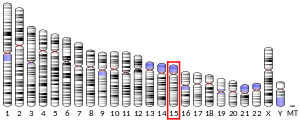From Wikipedia, the free encyclopedia
Mammalian protein found in Homo sapiens
The human gene UBR1 encodes the enzyme ubiquitin-protein ligase E3 component n-recognin 1 .[ 5] [ 6]
The N-end rule pathway is one proteolytic pathway of the ubiquitin system. The recognition component of this pathway, encoded by this gene, binds to a destabilizing N-terminal residue of a substrate protein and participates in the formation of a substrate-linked multiubiquitin chain. This leads to the eventual degradation of the substrate protein. The protein described in this record has a RING-type zinc finger and a UBR-type zinc finger. Mutations in this gene have been associated with Johanson–Blizzard syndrome .[ 6]
^ a b c GRCh38: Ensembl release 89: ENSG00000159459 – Ensembl , May 2017^ a b c GRCm38: Ensembl release 89: ENSMUSG00000027272 – Ensembl , May 2017^ "Human PubMed Reference:" . National Center for Biotechnology Information, U.S. National Library of Medicine .^ "Mouse PubMed Reference:" . National Center for Biotechnology Information, U.S. National Library of Medicine .^ Kwon YT, Reiss Y, Fried VA, Hershko A, Yoon JK, Gonda DK, Sangan P, Copeland NG, Jenkins NA, Varshavsky A (Aug 1998). "The mouse and human genes encoding the recognition component of the N-end rule pathway" . Proc Natl Acad Sci U S A . 95 (14): 7898– 903. Bibcode :1998PNAS...95.7898K . doi :10.1073/pnas.95.14.7898 PMC 20901 PMID 9653112 . ^ a b "Entrez Gene: UBR1 ubiquitin protein ligase E3 component n-recognin 1" .
Varshavsky A (1996). "The N-end rule: functions, mysteries, uses" . Proc. Natl. Acad. Sci. U.S.A . 93 (22): 12142– 9. Bibcode :1996PNAS...9312142V . doi :10.1073/pnas.93.22.12142 PMC 37957 PMID 8901547 . Chiannilkulchai N, Pasturaud P, Richard I, et al. (1995). "A primary expression map of the chromosome 15q15 region containing the recessive form of limb-girdle muscular dystrophy (LGMD2A) gene". Hum. Mol. Genet . 4 (4): 717– 25. doi :10.1093/hmg/4.4.717 . PMID 7633422 . Dgany O, Avidan N, Delaunay J, et al. (2003). "Congenital Dyserythropoietic Anemia Type I Is Caused by Mutations in Codanin-1" . Am. J. Hum. Genet . 71 (6): 1467– 74. doi :10.1086/344781 . PMC 378595 PMID 12434312 . Strausberg RL, Feingold EA, Grouse LH, et al. (2003). "Generation and initial analysis of more than 15,000 full-length human and mouse cDNA sequences" . Proc. Natl. Acad. Sci. U.S.A . 99 (26): 16899– 903. Bibcode :2002PNAS...9916899M . doi :10.1073/pnas.242603899 PMC 139241 PMID 12477932 . Ota T, Suzuki Y, Nishikawa T, et al. (2004). "Complete sequencing and characterization of 21,243 full-length human cDNAs" . Nat. Genet . 36 (1): 40– 5. doi :10.1038/ng1285 PMID 14702039 . Beausoleil SA, Jedrychowski M, Schwartz D, et al. (2004). "Large-scale characterization of HeLa cell nuclear phosphoproteins" . Proc. Natl. Acad. Sci. U.S.A . 101 (33): 12130– 5. Bibcode :2004PNAS..10112130B . doi :10.1073/pnas.0404720101 PMC 514446 PMID 15302935 . Yin J, Kwon YT, Varshavsky A, Wang W (2005). "RECQL4, mutated in the Rothmund-Thomson and RAPADILINO syndromes, interacts with ubiquitin ligases UBR1 and UBR2 of the N-end rule pathway" . Hum. Mol. Genet . 13 (20): 2421– 30. doi :10.1093/hmg/ddh269 PMID 15317757 . Gerhard DS, Wagner L, Feingold EA, et al. (2004). "The Status, Quality, and Expansion of the NIH Full-Length cDNA Project: The Mammalian Gene Collection (MGC)" . Genome Res . 14 (10B): 2121– 7. doi :10.1101/gr.2596504 . PMC 528928 PMID 15489334 . Kwak KS, Zhou X, Solomon V, et al. (2005). "Regulation of protein catabolism by muscle-specific and cytokine-inducible ubiquitin ligase E3alpha-II during cancer cachexia". Cancer Res . 64 (22): 8193– 8. doi :10.1158/0008-5472.CAN-04-2102 . PMID 15548684 . S2CID 20424565 . Tasaki T, Mulder LC, Iwamatsu A, et al. (2005). "A Family of Mammalian E3 Ubiquitin Ligases That Contain the UBR Box Motif and Recognize N-Degrons" . Mol. Cell. Biol . 25 (16): 7120– 36. doi :10.1128/MCB.25.16.7120-7136.2005 . PMC 1190250 PMID 16055722 . Stelzl U, Worm U, Lalowski M, et al. (2005). "A human protein-protein interaction network: a resource for annotating the proteome". Cell . 122 (6): 957– 68. doi :10.1016/j.cell.2005.08.029 . hdl :11858/00-001M-0000-0010-8592-0 PMID 16169070 . S2CID 8235923 . Zenker M, Mayerle J, Lerch MM, et al. (2006). "Deficiency of UBR1, a ubiquitin ligase of the N-end rule pathway, causes pancreatic dysfunction, malformations and mental retardation (Johanson-Blizzard syndrome)" (PDF) . Nat. Genet . 37 (12): 1345– 50. doi :10.1038/ng1681 . PMID 16311597 . S2CID 23050042 . Sasaki T, Kojima H, Kishimoto R, et al. (2006). "Spatiotemporal regulation of c-Fos by ERK5 and the E3 ubiquitin ligase UBR1, and its biological role" . Mol. Cell . 24 (1): 63– 75. doi :10.1016/j.molcel.2006.08.005 PMID 17018293 . Zou W, Wang J, Zhang DE (2007). "Negative Regulation of ISG15 E3 ligase EFP through its autoISGylation" . Biochem. Biophys. Res. Commun . 354 (1): 321– 7. doi :10.1016/j.bbrc.2006.12.210 . PMC 1858649 PMID 17222803 . Sakane A, Hatakeyama S, Sasaki T (2007). "Involvement of Rabring7 in EGF receptor degradation as an E3 ligase". Biochem. Biophys. Res. Commun . 357 (4): 1058– 64. doi :10.1016/j.bbrc.2007.04.052 . PMID 17462600 . Wei S, Lin LF, Yang CC, et al. (2007). "Thiazolidinediones modulate the expression of beta-catenin and other cell-cycle regulatory proteins by targeting the F-box proteins of Skp1-Cul1-F-box protein E3 ubiquitin ligase independently of peroxisome proliferator-activated receptor gamma" (PDF) . Mol. Pharmacol . 72 (3): 725– 33. doi :10.1124/mol.107.035287 . PMID 17569795 . S2CID 38439682 .
6.1 : Carbon-Oxygen6.2 : Carbon-Sulfur6.3 : Carbon-Nitrogen




